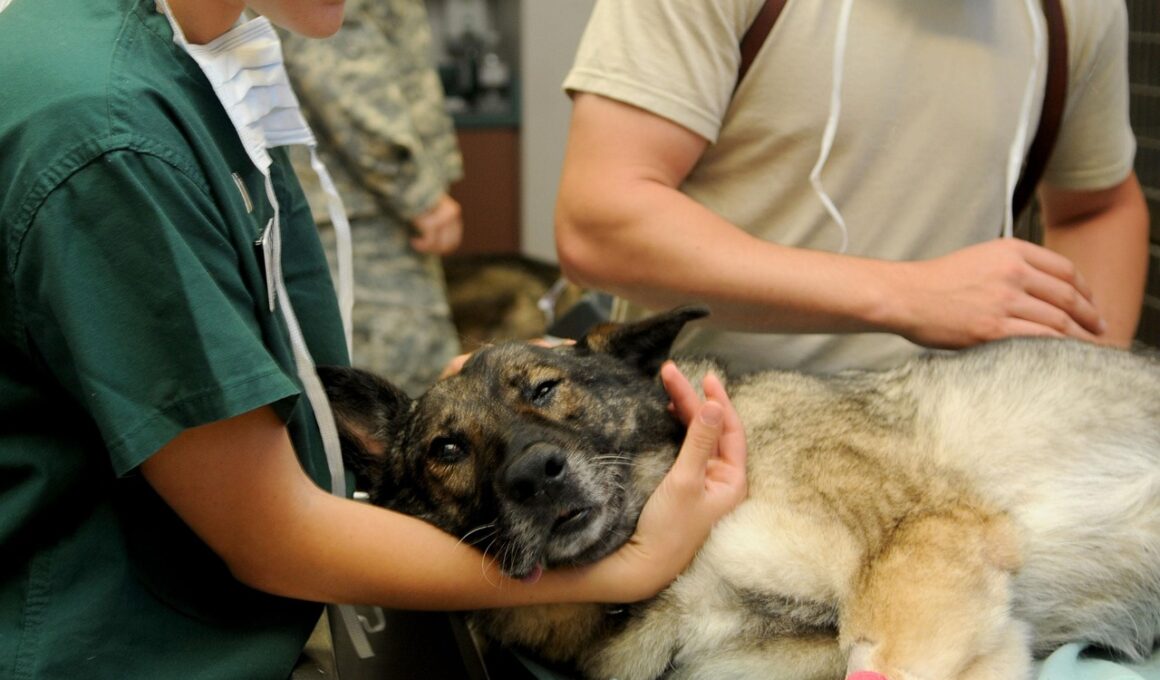Effective Treatments for Dog Allergies
Dog allergies can significantly disrupt both their lives and your family’s daily routine. Allergies in dogs often manifest in the form of skin irritations, itching, and excessive licking. If your furry friend exhibits these symptoms, it may be time to explore effective treatments. Common allergens include environmental factors like pollen, dust mites, or certain food ingredients. Identifying the cause of the allergy can make a real difference in managing symptoms effectively. It is essential to consult with your veterinarian to obtain a precise diagnosis. They may recommend skin tests or elimination diets to pinpoint specific allergens. Treatments can vary widely from over-the-counter antihistamines to more advanced medications like corticosteroids. Each dog is different, so tailor the treatment plan to your pet’s unique needs. Furthermore, maintaining a clean environment, free from common allergens can significantly improve your dog’s condition. Regular baths using hypoallergenic shampoos may also help alleviate skin issues. Keeping your dog’s fur clean can reduce direct contact with allergens and minimize their effect. Do not hesitate to seek your vet’s guidance before initiating any treatment plan.
To ensure the best outcome, a combined approach often yields the most effective results when treating allergies in dogs. Alongside medication, dietary changes can play a significant role in alleviating symptoms. For dogs with food allergies, your veterinarian may suggest an elimination diet to identify problematic ingredients. This could mean a shift to hypoallergenic dog food made with novel protein sources. Be sure to discuss any changes with your vet to ensure nutritional adequacy. Supplements such as Omega-3 fatty acids might support skin health and overall immune function. They can also help reduce inflammation and improve coat condition. Probiotics are another beneficial addition, promoting digestive health and potentially enhancing immune responses. To complement medical treatment, considering natural remedies can also provide relief. Certain herbs and botanical oils may possess anti-inflammatory properties. Always verify with your vet before introducing new supplements or remedies to your dog’s routine. Remember, gradual increases in dosage may be necessary for herbal treatments. It is essential to monitor your dog’s reaction to these changes closely. Observing your dog’s response can inform you about what effectively manages their allergy symptoms.
Environmental Adjustments
Making necessary environmental adjustments can greatly assist in managing your dog’s allergies. To start, regularly cleaning your home can help reduce allergen exposure. Use vacuum cleaners with HEPA filters to trap microscopic allergens lurking in carpets and furnishings. Frequent washing of your dog’s bedding and toys can also help mitigate exposure to allergens. Creating a dedicated space for your dog can limit allergen contact. Avoid letting your dog roam in high pollen areas during peak seasons. Additionally, implementing air purifiers in your home helps filter airborne allergens. They work effectively to clean the air your dog breathes, thereby minimizing respiratory irritations. Dog owners should also keep a close eye on various landscaping plants within their yards. Some may contribute significantly to your dog’s allergies. Consider planting low-allergen plants or maintaining a gravel or mulch landscape to reduce exposure. Furthermore, using specific shampoos designed to remove allergens from your dog’s coat can bring instant relief. Bathing your dog regularly can help remove allergens that might stick to their fur when outside. A proactive approach to your dog’s environment remains key in managing their allergy symptoms effectively.
Understanding Allergies
Understanding how allergies develop in dogs can also help dog owners take timely preventive measures. Allergies in dogs primarily occur when their immune system overreacts to a seemingly harmless substance, mistakenly identifying it as a threat. This response can result in various symptoms, ranging from mild itching to severe skin infections. Allergens can be categorized into three main groups: environmental, food-related, and flea allergies. Environmental allergens often include pollen, mold, and dust, while food allergies can stem from common ingredients like chicken or wheat. Flea allergies often develop from a reaction to flea saliva, causing intense itching. Regular flea preventative measures help in reducing this risk significantly. When exposed to these allergens, dogs often display symptoms after some time. Identifying the exact triggers may require a systematic approach, including food tracking or allergy testing. Proper awareness can help you implement timely preventive measures as required. It’s crucial to monitor your dog’s behavior regularly. Should any allergy symptoms continuously present themselves, consider revisiting your veterinarian for further assistance. Understanding the types and triggers can substantially improve your dog’s quality of life.
Hydration is another crucial factor in supporting your dog’s skin health, especially during allergy season. Keeping your dog well-hydrated can improve their skin elasticity and reduce dryness. Due to allergic reactions, many dogs tend to scratch or lick excessively, leading to further irritation and skin conditions. Providing fresh water at all times, along with hydration-focused diets, can enhance their coat health. You might also consider adding moist foods to their diet during severe allergy periods. Additionally, moderate use of soothing topical treatments can alleviate discomfort. Various sprays and ointments designed for dogs may offer calming effects on irritated skin. Aloe vera and oatmeal-based sprays are popular choices for their soothing properties. Always consult your veterinarian before initiating topical treatments to ensure your dog receives suitable products. The right topical treatment can provide immediate relief from itching and inflammation. Integrating hydrating foods and topical solutions alongside prescribed medications can bolster your dog’s defense against allergies. Ensure you keep a close watch on their skin condition and overall behavior. Such integrated efforts can significantly alleviate allergy-related discomfort, improving your dog’s quality of life.
Conclusion and Future Considerations
Addressing dog allergies is an ongoing journey involving continuous monitoring and adjustments. Your dog may require different treatments at various stages of life as their sensitivity to allergies evolves. Ensuring a regular check-in with your veterinarian can offer feedback and necessary course corrections for an effective treatment strategy. Staying informed and up to date with industry advancements in veterinary medicine is important. New treatments and strategies continuously emerge to help dogs grapple with it. Explore various resources like pet health blogs or forums for additional advice and support from others facing similar challenges. Remember also to regularly document your dog’s symptoms and treatment reactions. This log can be an invaluable tool during vet visits. As you explore solutions for treating your dog’s allergies, always prioritize their overall well-being and quality of life. Identifying key triggers and maintaining a proactive treatment plan can make a significant difference. Work closely with professionals for tailored advice that fits your dog’s needs. The reward will be a healthier, happier pet who can enjoy their life without the burden of allergies. Your consistent efforts contribute greatly to improving their overall health.
In conclusion, effective treatment for dog allergies encompasses a combination of proper diagnosis, treatment plan customization, and environmental management. The key to managing allergies effectively is to understand their various triggers and symptoms. Be vigilant in observing your dog’s behavior and store valuable notes. These notes will be handy during consultations with your veterinarian for optimal solutions. With the right combination, you can ensure that your dog lives a comfortable and active life, significantly reducing the impact of allergies. Proactive adaptability in treatment methods will foster better responses to allergens in your dog’s lifestyle. Following a comprehensive approach that includes dietary, environmental, and topical solutions can yield the best results. As you tread this continual path, remain committed to exploring the available treatment options. Your continuous effort plays a vital role in your dog’s health. Each dog is unique, and there may not be a one-size-fits-all solution. This emphasizes the importance of personalized care. The journey of treating dog allergies may seem challenging at times, but the ultimate reward of a healthy happy companion makes this effort worthwhile. By prioritizing their well-being, your dog can thrive without the burden of allergies.
Local Resources and Support
Engaging with local resources and communities can also be beneficial for managing your dog’s allergies. Many pet owners experience similar challenges and can offer support and useful advice based on their experiences. Local veterinary clinics may also host workshops or informational sessions regarding pet healthcare, including allergy management. Attending these sessions can provide valuable insights and updates on new treatments. Furthermore, exploring local pet supply stores will introduce dog owners to a wide range of allergy-friendly products. Understanding different grooming options available can be enlightening, especially as professional groomers often have tips for reducing allergen exposure for your dog. Exploring community forums online can help in gaining insights from experienced dog owners and can be uplifting. Joining local dog clubs or organizations can create opportunities for sharing experiences and tips about managing allergies effectively. Ultimately, collaboration with others reinforces a support network, ensuring that you are not navigating this journey alone. By leveraging local resources and community support, you enhance your ability to address your dog’s allergies competently and consistently. This aids in promoting a healthy and happy life for your dog, enriching both their lives and yours.


